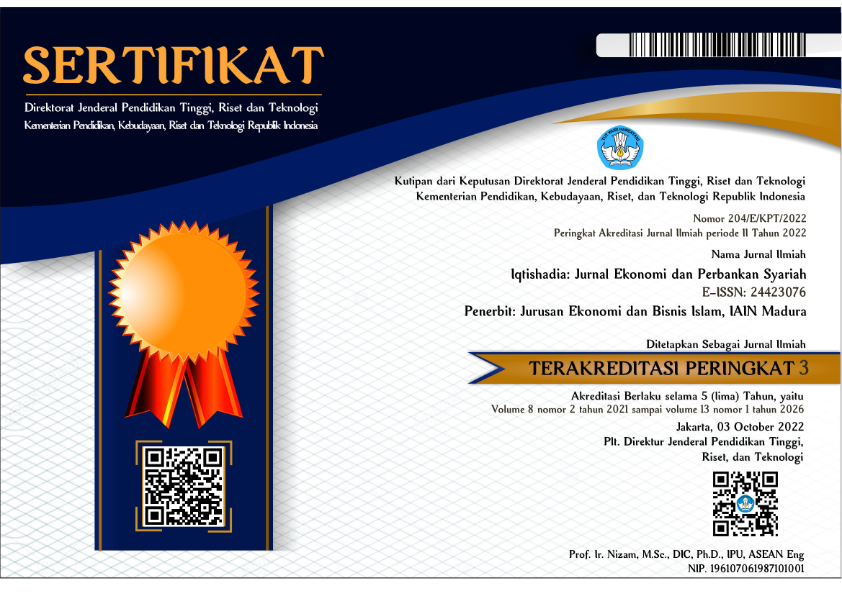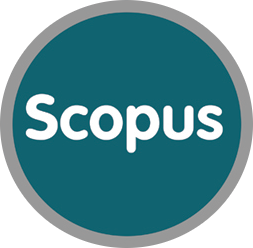Constructing Model of Integrated Zakat and Waqf Empowerment for Achieving Food Security and Poverty Alleviation
 Abstract views: 164
,
Abstract views: 164
,
 PDF downloads: 131
PDF downloads: 131
Abstract
Food security is one of the crucial factors in poverty alleviation, where adequate access to food can improve societal welfare and economic capacity. In Islam, zakat and waqf are essential instruments with great potential to support food security and poverty alleviation. This study aims to design a model that integrates zakat and waqf into an economic empowerment program based on food security to alleviate poverty. The proposed model, Zakat and Waqf Integration for Food Security Empowerment focuses on utilizing consumptive zakat funds for urgent food needs, followed by productive zakat for initial agricultural needs such as seeds and fertilizers, and the use of waqf funds, in the form of money and assets, to support long-term agricultural financing. The study results indicate that the integration of zakat and waqf within a single model has significant potential, given the growing potential of zakat and waqf in Indonesia, coupled with Government support for food self-sufficiency, making this model relevant. This model is expected to be an innovative solution in strengthening food security as an effort to alleviate poverty.
Downloads
References
Aditiya, Lip M. “Tingkat Kemiskinan Di Asia Tenggara 2023.” GoodStats.id, 2023. https://goodstats.id/infographic/tingkat-kemiskinan-di-asia-tenggara-2023-HBHy1#:~:text=Indonesia duduk di peringkat ke,kemiskinan tertinggi di Asia Tenggara.&text=Tingkat kemiskinan Indonesia terus menunjukkan,ribu orang per Maret 2023.
Atan, Nur Atika Binti, and Fuadah Binti Johari. “A Review on Literature of Waqf for Poverty Alleviation between 2006-2016.” Library Philosophy and Practice 2017, no. 1 (2017).
Bilal Khan, Mohammad, Shaiq Ahmad Ghafoorzai, Ibadurrehman Patel, and Damkar Mohammed Shehbaz. “Waqf Based Islamic Fintech Model for Agriculture Sector of Indonesia.” International Journal of Business Ethics and Governance, 2021, 73–85. https://doi.org/10.51325/ijbeg.v4i1.61.
Fad, Mohammad Farid. “Kontekstualisasi Maqashid Shari’ah Dalam Sustainable Development Goals.” Iqtisad Reconstruction of Justice and Welfare for Indonesia 6, no. 2 (2019): 130–55. https://doi.org/10.31942/iq.v6i2.3142.
Fadila. M.A, and N.A Putri. “Analysis of Food Security Development in Indonesia : A Big Data and Data Mining Approach.” Seminar Nasional Official Statistics , no. 2022 (2023): 1–10.
Food and Agriculture Organization of the United Nations. “The State of Food Security and Nutrition in the World 2023.” Http://Www.Fao.Org/, 2023. https://openknowledge.fao.org/server/api/core/bitstreams/f1ee0c49-04e7-43df-9b83-6820f4f37ca9/content/state-food-security-and-nutrition-2023/food-security-nutrition-indicators.html.
Fuadi, Debi S, Ade Sadikin Akhyadi, and Iip Saripah. “Systematic Review: Strategi Pemberdayaan Pelaku UMKM Menuju Ekonomi Digital Melalui Aksi Sosial.” Diklus: Jurnal Pendidikan Luar Sekolah 5, no. 1 (2021): 1–13. https://doi.org/10.21831/diklus.v5i1.37122.
Harahap, M. Guffar, Muhammad Fauzi Siregar, and Friska Haliza Siregar. “The Role of Islamic Social Finance in Reducing Poverty A Quantitative Study on Zakat and Waqf.Pdf.” International Journal of Islamic Economics and Business (IJIEB) 1, no. 1 (2024): 1–5. https://e-journalbarokahpublisher.com/index.php/IJIEB/article/view/97.
Hidayat, M. Fahmi, and Fauziyah Latiefa Salsabila. “Kontribusi Zakat Untuk Ketahanan Pangan Dan Pengentasan Stunting: Tinjauan Literatur Sistematis.” IHTIYATH : Jurnal Manajemen Keuangan Syariah 8, no. 1 (2024): 46–66. https://doi.org/10.32505/ihtiyath.v8i1.8536.
Hossain, Ishrat. “Application of Zakat to Food Security in the Context of Low-Income Rural Areas in Bangladesh: A Conceptual Model.” Zulkhibri, M., Ismail, A. (Eds) Financial Inclusion and Poverty Alleviation. Palgrave Studies in Islamic Banking, Finance, and Economics. Palgrave Macmillan, Cham, 2017. https://doi.org/https://doi.org/10.1007/978-3-319-69799-4_5.
Isa, Mohamad, and Abd Jalil. “Muamalat and Society Empowering Food Security Through Waqf.” Labuan E-Journal of Muamalat and Society (LJMS … 17, no. 1 (2023): 45–67. https://jurcon.ums.edu.my/ojums/index.php/LJMS/article/view/4589%0Ahttps://jurcon.ums.edu.my/ojums/index.php/LJMS/article/download/4589/2902.
Kasri, Rahmatina A. “Effectiveness of Zakah Targeting in Alleviating Poverty in Indonesia.” Al-Iqtishad: Journal of Islamic Economics 8, no. 2 (2016): 169–86. https://doi.org/10.15408/aiq.v8i2.3005.
Kemenag. “Potensi Capai Rp180 T, Kemenag Perkuat Kualitas Nazir Dan Kebijakan Tata Kelola Wakaf Uang.” kemenag.go.id, 2024. https://kemenag.go.id/nasional/potensi-capai-rp180-t-kemenag-perkuat-kualitas-nazir-dan-kebijakan-tata-kelola-wakaf-uang-nNKZD.
Kemenag. “Potensi Mencapai 327 T, Ini Tiga Fokus Kemenag Dalam Pengembangan Zakat.” kemenag.go.id, 2023. https://kemenag.go.id/nasional/potensi-mencapai-327-t-ini-tiga-fokus-kemenag-dalam-pengembangan-zakat-LobJF.
Kementerian Keuangan Republik Indonesia. “Jaga Ketahanan Pangan, Sektor Pertanian Menjadi Perhatian Utama Pemerintah.” kemenkeu.go.id, 2024. https://www.kemenkeu.go.id/informasi-publik/publikasi/berita-utama/Sektor-Pertanian-Fokus-Utama-Pemerintah.
Kementerian Koordinator Bidang Perekonomian. “Dukung Swasembada Pangan Untuk Kemandirian Bangsa, Pemerintah Dorong Penerapan Sistem Pertanian Ramah Lingkungan.” ekon.go.id, 2023. https://www.ekon.go.id/publikasi/detail/5305/dukung-swasembada-pangan-untuk-kemandirian-bangsa-pemerintah-dorong-penerapan-sistem-pertanian-ramah-lingkungan.
Lestari, Hanisa Sismaya. “Pertanian Cerdas Sebagai Upaya Indonesia Mandiri Pangan.” AGRITA (AGri) 2, no. 1 (2020): 55. https://doi.org/10.35194/agri.v2i1.983.
Mahlufah. “Peran Zakat Produktif Dalam Pemberdayaan Ekonomi Mustahiq.” JES: Jurnal Ekonomi Syariah 9, no. 2 (2024): 1–93. https://doi.org/https://doi.org/10.30736/jes.v9i2.882.
Mahomed, Ziyaad, and Muhammed Hydara. “Applying an Integrated Islamic Social Finance Model for the Empowerment of Women Farmers in The Gambia.” In Islamic Finance in Africa, edited by M Hassan, Aishath Muneeza, and Karamo Sonko, 2022. https://doi.org/https://doi.org/10.4337/9781802209907.00028.
Maskur, Sitti Rachma Ramadhani, Hasan Aedy, Zainuddin Saenong, Tajuddin, Saemu Alwi, and La Ode Samsul Barani. “Pengaruh Ketimpangan Pendapatan, Pengangguran, Dan Pembangunan Manusia Terhadap Kemiskinan Di Indonesia Periode 2017-2021.” Jurnal Progres Ekonomi Pembanguan 8, no. 1 (2023): 82–95. http://ojs.uho.ac.id/index.php/JPEP.
Melis, and Hikmah Endraswati. “Strategi Pengelolaan Wakaf Uang Perspektif Tokoh Di Indonesia.” JESIL: Jurnal Ekonomi Syariah Dan Industri Halal 1, no. 1 (2024): 22–31.
Rahman, Ripki Mulia, Hendri Tanjung, and Ibdalsyah. “Optimalisasi Wakaf Produktif Untuk Memperkuat Sistem Ketahanan Pangan.” El-Mal: Jurnal Kajian Ekonomi Dan Bisnis Islam 3, no. 5 (2022): 1147–66. https://doi.org/DOI:1047467/elmal.v3i5.1988.
Rizal, Ahmad, Neneng Ela Fauziyah, Aminuddin Ma’, and Adib Susilo. “Integrating Zakah and Waqf for Developing Islamic Economic Boarding School (Iebs) Project in Indonesia.” Journal of Islamic Economics and Philanthropy (JIEP). E-ISSN 03, no. 02 (2020): 2655–335.
Sakti, Lanang, and Nadhira Wahyu Adityarani. “Tinjauan Hukum Penerapan Akad Ijarah Dan Inovasi Dari Akad Ijarah Dalam Perkembangan Ekonomi Syariah Di Indonesia.” Jurnal Fundamental Justice, 2020, 35–50.
Samheri, Mamlatus Sholehah, and Mutimatus Zahrah. “Wakaf Produktif Sebagai Pengentasan Kemiskinan.” ICoIS: International Conference on Islamic Studies 2 (2021): 114–60. https://ejournal.iaforis.or.id/index.php/icois/article/view/24.
Setiawan, Firman. “Kemiskinan Dan Pengentasannya Dalam Pandangan Islam.” Jurnal Dinar Ekonomi Syariah 1, no. 1 (2016): 1–11.
Siregar, Ramnah, Rosyetti Rosyetti, and Rahmat Richard. “Analisis Perbandingan Distribusi Zakat Produktif Dan Konsumtif Di Badan Amil Zakat Nasional (Baznas) Kota Pekanbaru Tahun 2011-2020.” Jurnal Sosial Ekonomi Dan Humaniora 7, no. 2 (2021): 158–65. https://doi.org/10.29303/jseh.v7i2.42.
Siregar, Sopia Kholilah, Darwis Harahap, and Rini Hayati Lubis. “Peran Dana Zakat Produktif Dalam Meningkatkan Pendapatan Mustahiq.” Journal of Islamic Social Finance Management 2, no. 2 (2021): 225–36. https://doi.org/10.24952/jisfim.v2i2.5016.
Syahril, Syahril, Wahyuddin Abdullah, and Syahruddin Syahruddin. “Model Pemberdayaan Ekonomi Dengan Filantropi Islam Dalam Mewujudkan Kesejahteraan Masyarakat.” IQTISHADIA Jurnal Ekonomi & Perbankan Syariah 6, no. 1 (2019): 25–40. https://doi.org/10.19105/iqtishadia.v6i1.2296.
The journal operates an Open Access policy under a Creative Commons Non-Commercial Share-Alike license. All articles published Open Access will be immediately and permanently free for everyone to read and download.
• Creative Commons Attribution-NonCommercial (CC-BY-NC)

Iqtishadia: Jurnal Ekonomi dan Perbankan Syariah by http://ejournal.iainmadura.ac.id/index.php/iqtishadia is licensed under a Creative Commons Attribution-NonCommercial 4.0 International License.
Based on a work at http://ejournal.iainmadura.ac.id.

























